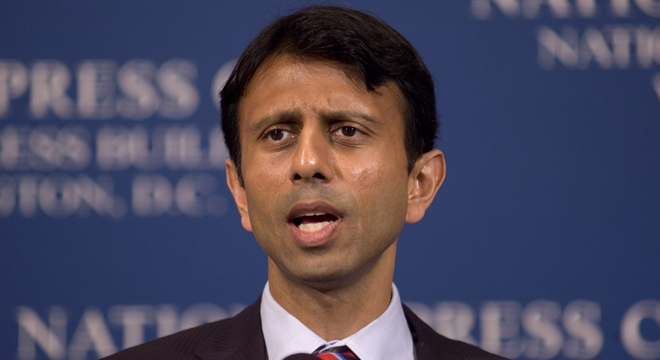Sure the GOP may need a little outreach here and a little fine tuning there, but Republicans in Washington say they’re confident that a principled message of low taxes and cuts to social services will eventually propel them back to victory. They may want to take a look at Louisiana first.
Governor Bobby Jindal (R-LA), considered a leading presidential contender in 2016, is suffering a political meltdown in his home state. His approval rating plummeted to 38 percent in a poll last week by the non-partisan Southern Media Opinion & Research, down from 60 percent just a year ago. In an ominous sign for national Republicans, the immediate cause is a sweeping economic agenda with strong parallels to the House GOP’s latest budget.
On Monday, Jindal scrapped his own proposal to eliminate the state’s income and corporate taxes and replace them with a statewide tax on sales and business services. His retreat was a concession to the reality that the proposal was headed towards a humiliating defeat — and taking Jindal down with it along the way. Jindal said in a speech to lawmakers that the backlash against his plan “certainly wasn’t the reaction I was hoping to hear,” but that he would respect the public’s wishes and start again.
Jindal’s proposal was different than tax plans by national Republicans like Mitt Romney and Paul Ryan in that it planned to eliminate income and corporate taxes entirely instead of just lower rates, but the provisions that inflamed the public against it overlap plenty with national GOP proposals. Namely, both plans generated complaints from economists that they would require regressive tax increases on the poor and middle class to pay for lower taxes for the wealthy.
Grover Norquist, the intellectual leader of the anti-tax crowd in Washington, had praised Jindal’s plan as “the boldest, most pro-growth state tax reform in U.S. history.” He noted that it was particularly significant, because with Obama positioned to veto anything resembling the House GOP’s budget for the next several years, Louisiana might be Republicans’ best chance to show off their tax ideas on the state level.
“The national media and Acela-corridor crowd continue to focus on the bickering Washington, but they can learn what real tax reform looks like by looking to Louisiana,” Norquist said.
It didn’t turn out that way. Only 27 percent of Louisiana voters supported the plan in the latest SMOR poll versus a whopping 63 percent opposed. The idea didn’t even garner majority support among Republicans.
According to SMOR pollster Bernie Pinsonat, Jindal’s true approval is likely even lower than their mid-March poll indicated.
“The decline there came from his political style, his travel out of state, his budget cuts, additional talk of more budget cuts, and of course the tax plan,” Pinsonat said. “But after the survey, there were two or three major things that happened that absolutely would have made these numbers worse.”
Opposition to his tax reforms expanded in early April as religious leaders joined advocates for the poor in complaining the sales tax increase would hurt working families. Jindal’s staff countered that they’d make sure the cost of the tax cuts would mostly fall on businesses instead of individuals, but that concession prompted the influential Louisiana Association of Business and Industry to come out against it as well. Meanwhile, an analysis by the non-partisan Public Affairs Research Council suggested that Jindal would need to come up with hundreds of millions of dollars more in revenue to make the numbers add up at all. With both the progressive left and pro-market right united against it, Republicans in the legislature began to rebel.
“Just about everyone dislikes this plan,” Pearson Cross, a professor of political science at University of Louisiana-Lafayette, told TPM. “It’s been roundly excoriated, frankly. And all of this has taken a toll on his popularity, which is at a historic low heading into the legislative session when he needs to have higher popularity than he’s ever had.”
But that’s taxes. What about the spending side of the equation? Jindal’s not doing himself any favors there either, drawing at least as widespread a backlash to his proposed reductions to health care and higher education funding. Seventy-eight percent of respondents told SMOR they opposed further cuts to the state health care system, and 60 percent said they believed the budget had been cut enough in general already. It doesn’t help that Jindal refuses to take federal money from the Affordable Care Act to expand the state’s Medicaid system.
Given that the House GOP’s plan would cut Medicaid spending by nearly one-third in the next decade, it may be time to rethink just how popular the whole “starve the beast” approach actually is with voters.
This post has been updated.









